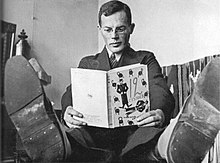Loading AI tools
Novel by Ilya Ilf and Yevgeny Petrov From Wikipedia, the free encyclopedia
The Twelve Chairs (Russian: Двенадцать стульев, romanized: Dvenadtsat stulyev) is a Russian classic satirical picaresque novel by the Soviet authors Ilf and Petrov, published in 1928. Its plot follows characters attempting to obtain jewelry hidden in a chair. A sequel was published in 1931. The novel has been adapted to other media, primarily film.
This article has multiple issues. Please help improve it or discuss these issues on the talk page. (Learn how and when to remove these messages)
|
 Ilya Ilf reads the novel, 1930 | |
| Author | Ilf and Petrov |
|---|---|
| Original title | Двенадцать стульев |
| Language | Russian |
Publication date | 1928 |
| Publication place | Soviet Union |
Original text | Двенадцать стульев at Russian Wikisource |
| Translation | The Twelve Chairs at Wikisource |

In the Soviet Union in 1927, during the NEP era, a former Marshal of the Nobility, Ippolit Matveyevich "Kisa" Vorobyaninov, works as the registrar of marriages and deaths in a sleepy provincial town. His mother-in-law reveals on her deathbed that her family jewellery was hidden from the Bolsheviks in one of the twelve chairs from the family's dining-room set. Those chairs, along with all other personal property, were taken away by the Communists after the 1917 Russian Revolution. Vorobyaninov wants to find the treasure. The “smooth operator” and con-man Ostap Bender forces Kisa to become his partner, and they set out to find the chairs. Bender's street-smarts and charm are invaluable to the reticent Kisa, and Bender comes to dominate the enterprise.
The "conсessioners" trace the chairs, which are to be sold at auction in Moscow. They fail to buy them and learn that the chairs have been split up for resale individually. Roaming all over the Soviet Union in their quest to recover the furniture, they have a series of comic adventures, including living in a students' dormitory with plywood walls, posing as bill-painters on a riverboat to earn passage, bamboozling a village chess-club with promises of an international tournament, and traveling on foot through the mountains of Georgia. Father Fyodor (who had known of the treasure from the confession of Vorobyaninov's mother-in-law), their obsessed rival in the hunt for the treasure, follows a bad lead, runs out of money, ends up trapped on a mountain-top, and loses his sanity. Ostap remains unflappable, and his mastery of human nature eliminates all obstacles, but Vorobyaninov's mental state steadily deteriorates.
They slowly acquire each of the chairs in turn, but no treasure is found. Kisa and Ostap finally discover the location of the last chair. Finally fed up with his deceitful partner's greedy arrogance and condescending meanness, Vorobyaninov murders[lower-alpha 1] Ostap in his sleep so as to keep all the loot for himself, but then discovers that the jewels have already been found and were used to fund the building of the new public recreation center in which the chair was found, a symbol of the new society. Angered, Vorobyaninov loses his own sanity.
Ostap Bender reappears in the book's sequel The Little Golden Calf, despite his apparent death in The Twelve Chairs.
The novel has inspired at least twenty adaptations in the Soviet Union and abroad:
Seamless Wikipedia browsing. On steroids.
Every time you click a link to Wikipedia, Wiktionary or Wikiquote in your browser's search results, it will show the modern Wikiwand interface.
Wikiwand extension is a five stars, simple, with minimum permission required to keep your browsing private, safe and transparent.